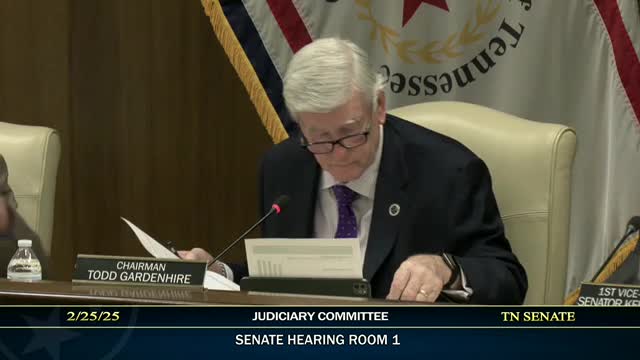Heated hearing on constitutional change to let judges deny bail for certain charges; committee advances resolution
Get AI-powered insights, summaries, and transcripts
Subscribe
Summary
A constitutional amendment that would give Tennessee judges explicit authority to deny pretrial bail for a broader set of charges drew extended testimony from both sides during a long Judiciary Committee hearing.
A constitutional amendment that would give Tennessee judges explicit authority to deny pretrial bail for a broader set of charges drew extended testimony from both sides during a long Judiciary Committee hearing.
Leader Johnson introduced Senate Joint Resolution 25, which would amend Article I, Section 15 of the Tennessee Constitution so judges could deny bail before conviction for additional offenses beyond capital murder. Johnson said the change aims to let judges consider public‑safety risk when setting or denying bail for crimes such as terrorism, aggravated sexual offenses involving children and other offenses listed in the state’s Truth and Sentencing law; the resolution would also require judges who deny bail to state the reasoning on the record.
The committee heard roughly equal numbers of witnesses urging 'yes' and 'no.' Supporting testimony included Rafael Mangual of the Manhattan Institute and other criminal-justice researchers who said pretrial detention can prevent repeat violent offenses. Nathan Ridley and other representatives of Tennessee bail agents warned against broad preventive detention policies that would upend the bail industry and shift costs to counties. Jeff Clayton of the American Bail Coalition warned of historical consequences when governments detain political opponents and urged statutory, not constitutional, solutions. Nick Wachinski, a defense and jail‑practice attorney with experience in other states, highlighted drafting and due‑process concerns, particularly about references that would tie bail‑eligibility to lists that might change over time.
Sheriffs and the Tennessee District Attorneys General Conference supported the resolution. Stephen Crump, executive director of the DAs’ conference, told the committee prosecutors see many cases that pose public‑safety risks under current practice and that this amendment would give judges tools to protect communities. Jimmy Musick of the Tennessee Sheriffs’ Association said many jailed defendants are pretrial and argued that judges need discretion to deny release for those who pose threats to public safety.
Opponents warned of fiscal cost and civil‑liberties consequences. Witnesses who oppose the resolution said preventive‑detention regimes in other jurisdictions had large state and local costs and lengthened average time to disposition; they also warned of racial and civil‑rights effects if judges used charge‑based lists as a proxy for dangerousness. Several legal witnesses raised a due‑process concern about a cross‑reference in the proposed amendment to the Truth and Sentencing Act that would tie bail ineligibility to a list that could be amended after voters consider the constitutional change; counsel warned that the ballot question should reference a fixed list or otherwise be made clear to voters so that the electorate knows what they are approving.
Committee members asked detailed questions about: whether judges already may consider public safety; how the amendment would affect the three‑branch balance of power; fiscal impact on local jails and counties; and the standard of proof required to deny bail (“where the proof is evident or the presumption great”). Legal witnesses said courts have applied similar standards historically but that a number of procedural questions — evidentiary hearing procedures, proof standard, speedy‑trial implications, and the interplay with later legislative changes — could be the subject of litigation.
After several hours of testimony and questioning, the committee voted to advance SJR 25 by roll call. The record shows divided opinions from committee members, and the transcript captures multiple requests that the House and Senate counsel, and the attorney general’s office, examine the constitutional language and possible fiscal consequences before final floor action.
—
(Reporting note: the hearing included extended panels for and against preventive detention. Witnesses cited specific state experiences and empirical studies; the committee’s vote reflects the same division visible in the testimony.)
